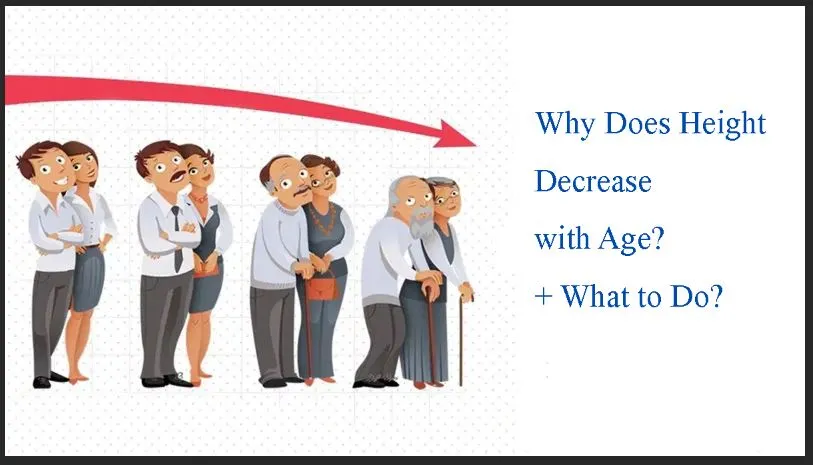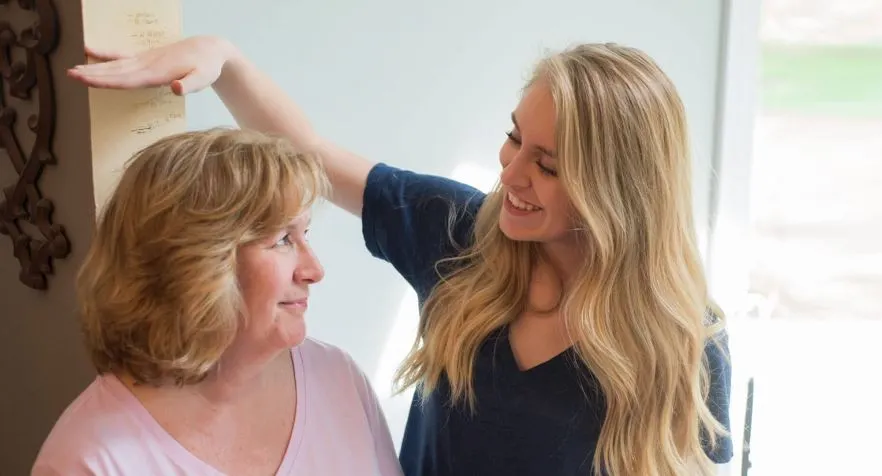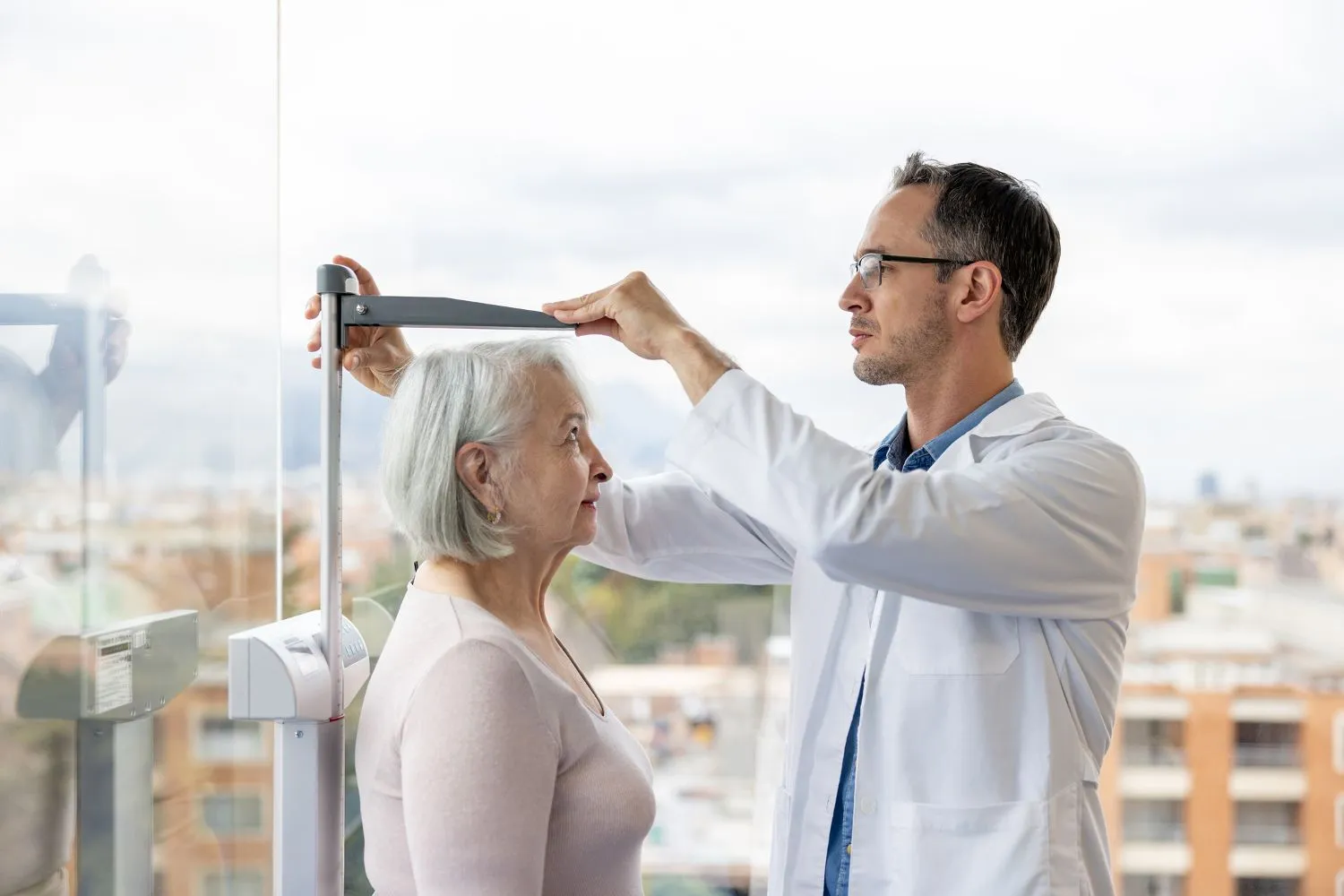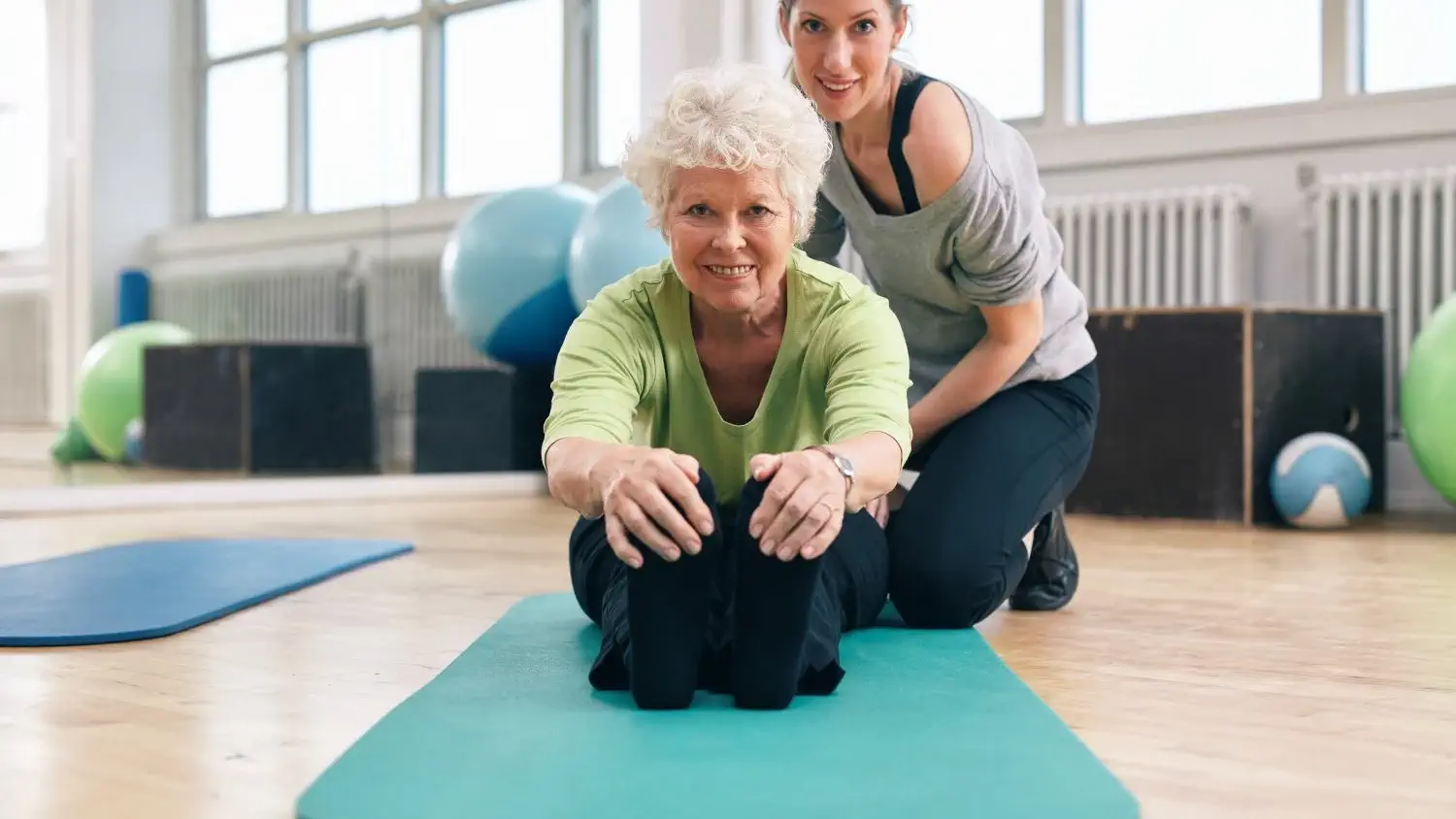
Why Does Height Decrease with Age? + What to Do?
Why does height decrease with age? There is a significant relationship between aging and shrinking. Did you know about this? We have heard many times that as we age, our height becomes shorter. But what most of us may not know is that in addition to height, vision, hearing, memory and hair, the heart, facial bones and sexual organs also shrink. Older adults may become shorter as they age as the cartilage between their joints wears down. As a result, osteoporosis occurs, which causes people shrink.
In general, people’s body shape changes naturally with age. These changes also include shortness of height. Increasing height in adulthood is far from reach and not much can be done in this field. But there are solutions that can be used to prevent the age-related height loss.
What causes elderly to be bent over? Do people really shrink with age? Have you noticed that your grandmother looks shorter than she appears in photos? In fact, human height decreases significantly in old age, so what exactly is happening?! In this article from the website of humanhealthmag, we discuss the issue of why does height decrease with age? How to prevent losing height as we age? And many other things.
Human Height Growth
Before answering the question that Why does height decrease with age? It is better to know how the height of people is determined? The height of a person is the distance from the ground on which he/she stands to the head of each person in a standing and vertical position. Height is one of the appearance characteristics that affects a person’s social desirability and the level of satisfaction with appearance.
Almost all humans will be growing in height from the time they are born until a few years after puberty, and after that, the growth cycle will stop and there will be no further growth in height. The most important & effective factor that affects the height of humans is their genetics and inheritance. Nutritional and environmental factors are also related to height and height increase.
Height growth usually continues until the age of 15-17. In rare cases, height growth can continue until the age of 21. (It can be due to certain types of diseases, or due to the delay in the start of height growth, the growth will be completed later.

Why Does Height Decrease with Age? Time of Begin Shrinking or Shortening of Height Due to Aging
The rate of loss of bone density starts from the age of 30 (sometimes up to 40) and reaches its peak at the age of 50 and in women during menopause. How much height is lost with age? Every ten years after this age, a person loses about one centimeter. Therefore, we may lose 1 to 3 inches (2.5 to 7.5 cm) of height as we age. In this case, curvature of the spine or osteoporosis and skeletal muscle changes will occur, which causes the height of the vertebrae to decrease and the person’s height to decrease. This loss of height accelerates with age: the older people get, the faster they shorten.
Why Does Height Decrease with Age? Causes of Shrinking in Old Age
- Lack of certain vitamins and minerals (especially vitamins D3 and K2, which are necessary for the absorption of calcium and magnesium)
- Low estrogen (especially in women, whose secretion of this hormone decreases after menopause)
- Lack of protein in the body (for example, digestive problems, such as a decrease in stomach acid, which can cause a lack of protein absorption or insufficient consumption)
- Lack of exercise (exercise puts beneficial stress on the body, and the body begins to strengthen its bones and muscles to compensate for this stress)
- Deficiency of growth hormone and IGF-1 with increasing age and decrease in bone growth of people
Why Does Height Decrease with Age? Symptoms of Shrinking
Why Does Height Decrease with Age? It is better to know that with age, the following changes and symptoms appear in people:
- Strength and endurance changes. Loss of muscle mass leads to decreased strength.
- Bones become more fragile and may break more easily. Overall height is reduced, mainly because the trunk and spine are shortened.
- The overall body posture may appear more hunched over. Knees and hips may be more bent. The neck may tilt and the shoulders narrow while the pelvis becomes wider.
- Fractured joints may cause inflammation, pain, stiffness, and deformity. Joint changes affect almost all elderly people. These changes range from mild stiffness to severe arthritis.
- Movements are slowed and may be limited. The walking pattern becomes slower and shorter. Also, walking may become unstable and swinging of the arm may decrease. Older people get tired more easily and have less energy.

Why Does Height Decrease with Age?
Why does human height get shorter with age? Human shrinking with age (as early as our 30s) due to loss of cartilage. The cartilaginous pads between the joints of the leg bones and the spine are destroyed over time. In this way, the height of people becomes shorter with age. Osteoporosis is another reason for shrink in height, that causes the vertebrae of the spine to shrink.
Why we lose height as we get older؟ With increasing age, the muscle volume of a person also decreases, which aggravates the sagging of the bone skeleton of the body. After the age of 30, men become shorter by an inch and women by about two inches. This trend continues until the age of 70 and after the age of 80, both men and women lose another inch.
shrinking in old Age Due to Spine Problems
Why do we get shorter as we age? As we said, most people after the age of forty will lose 0.39 inches of height after every decade of their life. By age 80, most men are 1.96 inches shorter and women 3.14 inches shorter. Why are women getting shorter? This is because women experience a greater drop in estrogen levels during menopause (a type of female hormone that protects bones in both men and women).
In addition, men have more muscle, which is more effective in protecting the body structure, and from the age of 35, bones start to lose minerals. With age, the ability of the elderly body to replace bones slows down, and with the occurrence of osteoporosis, the bones of the elderly body become smaller and more fragile. The discs between the bones are also flattened, and all these factors contribute to the shortening of the height of the elderly. Between the vertebrae, there are 23 gel-like discs that have a shock-absorbing function and consist of 88% water.
During the day, when the elderly is moving, sitting or standing, these fluids in the interverte- bral discs are naturally removed by putting pressure on the discs, and at night, when lying down, the fluid is reabsorbed to the discs. For this reason, during the day we become 0.29 inches shorter than at night. But with age, the discs become slightly flattened, which leads to permanent shortening in the elderly.

How Can I Stop Age Related Height Loss? 3 Effective Ways
Now that we understand why does height decrease with age? We will introduce 3 effective ways to prevent shrinking in old age. Really, how to prevent losing height as we age? Continue to reading.
The following list shows the factors that we choose to improve our physical condition. Shrinking in old age can be partially prevented with the following methods:
1- Periodic Examination
By periodically visiting a doctor and being examined by him, as well as performing tests related to height, health of joints and bones, as well as general health of the body, and following the recommendations of experts, shrinking in old age can be prevented to a large extent. Certain medications that are taken regularly can cause osteoporosis. If possible, consult your doctor to reduce or stop using them.
2- Proper Nutrition
Having a healthy & balanced diet that includes fruits, vegetables, whole grains, the right amount of healthy fats and no red meat can lead to good health. Also, taking calcium and vitamin D supplements improves bone density. Postmenopausal women and people at risk of developing osteoporosis should consume 800 units of vitamin D and 1200 mg of calcium daily. Also, excessive consumption of tobacco and alcohol also causes bone loss. Therefore, their consumption should be limited.
3- Exercise and Corrective Movements
Regular exercise is also very important. Try to keep your physical activity and be active. Exercise can prevent and reverse many age-related changes in muscles, bones, and joints. Stretching is another great way to help keep joints flexible. Balance and coordination exercises, such as tai chi, can help reduce your risk of falling.
Exercise can also make bones stronger and help slow bone loss. Older people can increase strength and muscle mass through muscle strengthening activities. Physical activity in older age may delay the progression of osteoporosis because it slows the rate at which bone mineral density declines. Older people who exercise in water may still experience increased bone and muscle mass compared to sedentary older people. Weight-bearing exercises such as walking or weight training are the best type of exercise to maintain bone mass.
Concluding Remarks
Why does height decrease with age? In previous article, we talked about how to keep elderly from sliding out of chair? In this article, we talked about how can I prevent shrinking? The best way to prevent shortness of height due to aging is to do things that prevent the loss of bones. As with many age-related changes, there are things we can do to prevent or delay them.
Can we stop shortness of height over time? The answer is that nothing can actually prevent the effects of aging, but you can delay this change by adopting some healthy lifestyle habits. Exercising is a great solution to reduce problems related to bones and muscles and thus indirectly affects your height. Also, eat a diet rich in calcium and vitamin D, which helps you maintain your bones and compensate for mineral loss. Avoid smoking and drinking large amounts of caffeine.

FAQs
How Is the Height of People Determined?
Our height depends on various factors including genetics, gender, nutrition and physical activity. The height also depends on the length of the leg bones, spine and skull. Bones of the leg and skull remain unchanged with age and after maturity, but the bones of the spine shrink. As people age, in almost adulthood, bones begin to thin out. Each of the vertebrae is shortened a little and as a result, our height is also shortened. If a person also has osteoporosis, their height can be shortened by several inches.
Why Do People Get Shorter as They Age?
In general, people’s body shape naturally changes with age. Elderly people can become shorter as they age because the cartilage between their joints wears down. As a result, osteoporosis occurs, which causes shrinking. These changes include shrinking and it is inevitable.
In Which People Does Aging Cause Shrinking?
Shortness of height occurs in all races and both sexes. People’s height usually decreases by 0.39 inches every 10 years after the age of 40. shrink in height becomes faster after the age of 70. In total, you may lose about 0.98 inches to 2.95 inches of height as you age.
How to Prevent Shrinking Due to Age?
The best way to prevent shrinking due to aging is to do things that prevent bone loss. Following a healthy diet, physical activity and taking care of bones are some examples of these things.
